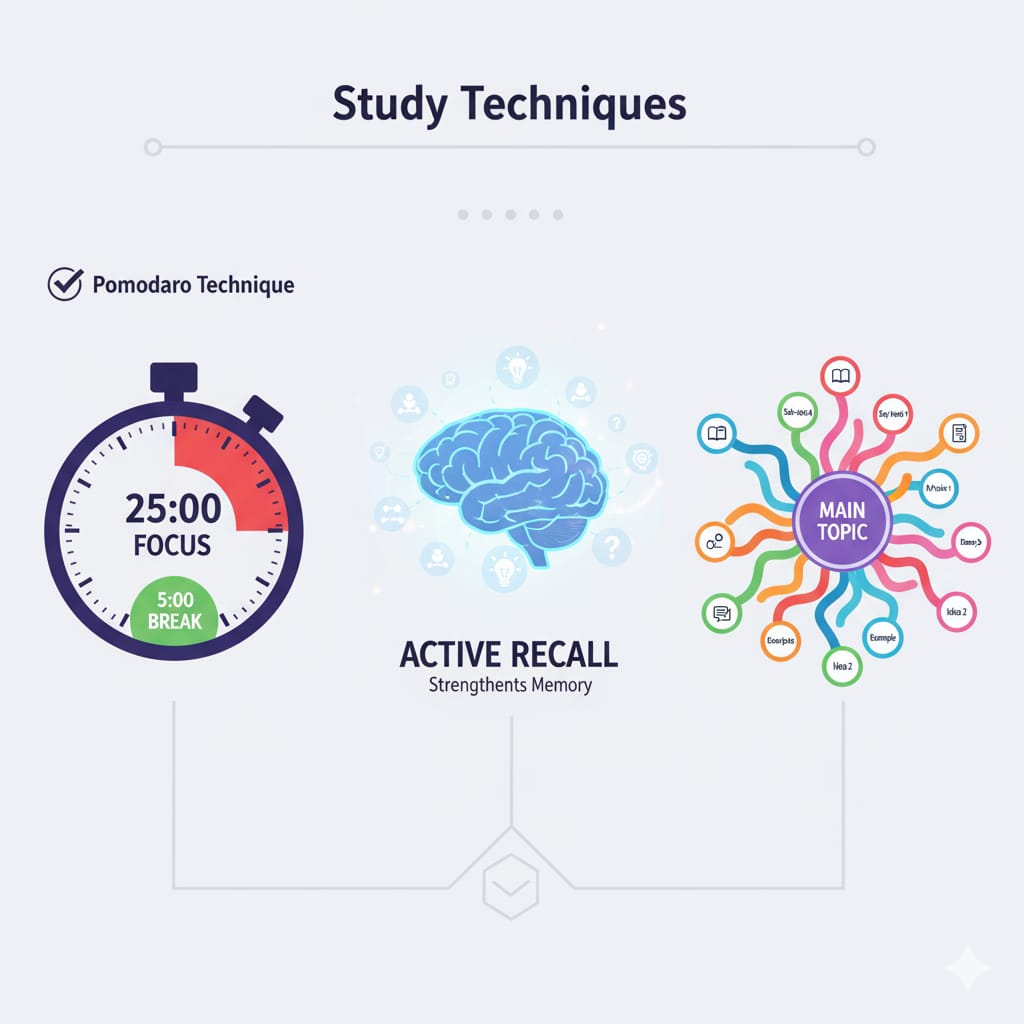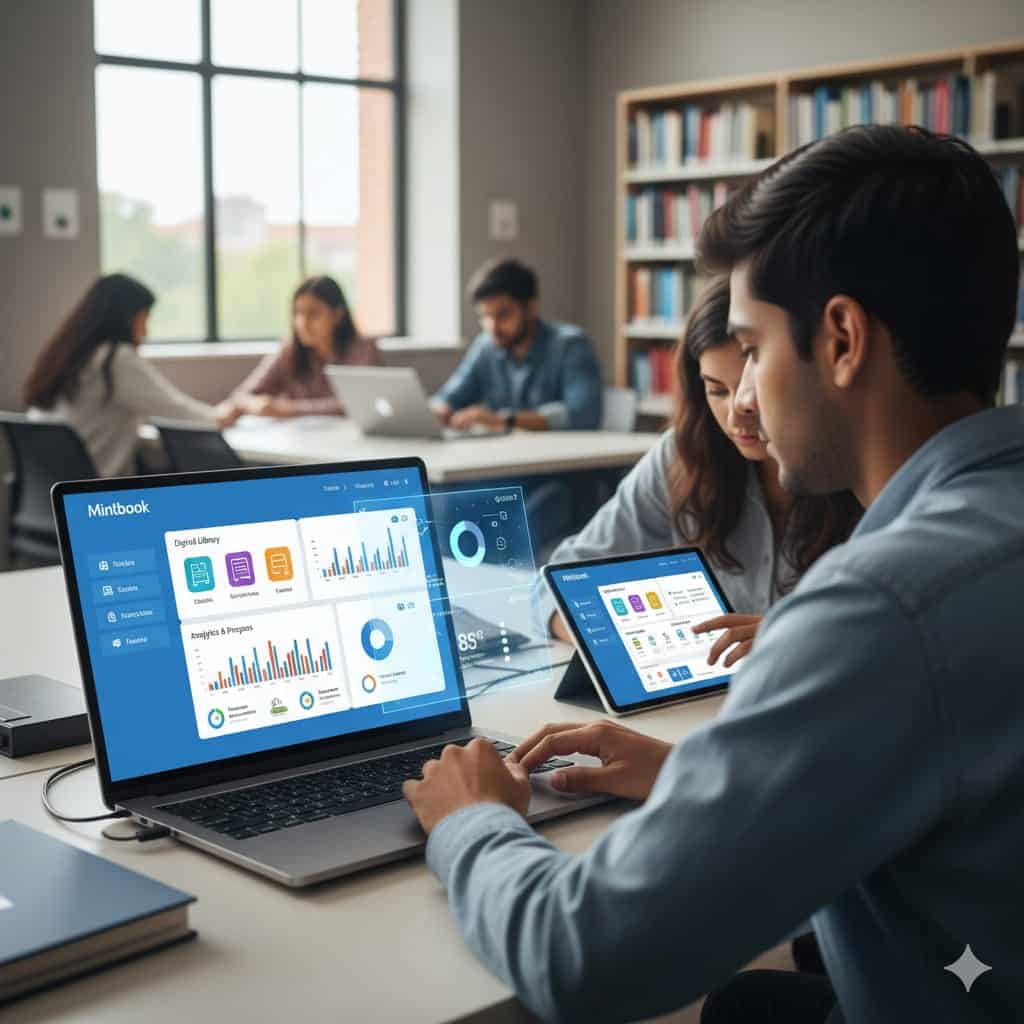It is quite difficult to prepare when taking competitive exams such as JEE, NEET, or CUET during school. The test is bulky, the competition is not easy, and time is scarce. Nevertheless, some students obtain success with ease. They do not work hard; they study to be smart. The idea of smart work is aimed at the optimization of study time, effective learning techniques, and the application of digital tools. The following are some clever Class 11th and 12th study tips.
1. Master Time and Memory: Pomodoro, Active Recall, and Spaced Repetition
Pomodoro Technique: Concentration in Sessions.
If you’re finding it hard to focus, the Pomodoro technique really shakes things up. Here’s how it goes: work for 25 minutes, take a quick 5-minute break, and after four rounds, step away for a longer break—20 to 30 minutes to recharge.
This method keeps your mind sharp and stops you from burning out. You can grab a timer or use apps like Focus Booster or TomatoTimer to keep track. Stick with it, and you’ll actually get more done and spend way less time putting things off.
Active Recall: Train Your Brain to Remember.
Test yourself instead of going through notes again and again. Active recall aids in the enhancement of memory as your brain recalls information. Having studied, close your book and write down the things that you remember or tell them aloud. On-the-go quizzing is enhanced through smart digital flashcard tools such as Quizlet or Anki.
The Spaced Repetition Study: Learn Less, Memorize More.
What we study, we forget unless we refresh it at regular intervals. The use of spaced repetition is an attempt to address this problem by providing a revision of information, with successive time intervals, say, 1 day, 3 days, 7 days, and 14 days. This method entraps ideas in your long-term memory.

Spaced repetition built into apps can be used to automatically schedule your revision, and you never feel like you’re studying the wrong things at the wrong time. It is one of the best methods of memorising large quantities of information when used in combination with active recall.
2. Mind Mapping & Note-Making Hacks: Visualize Your Learning
Not every note is created equal. It is not that smart students are copying the textbook content, but structuring the information visually and logically.
Mind Mapping: Bridging the Gaps
Mind maps are drawings that are used to illustrate ideas and their interrelationships. As an example, a key term such as Periodic Table, in Chemistry, can have extensions in the form of Trends, Groups, and Reactions. This assists you in imagining the relationships rather than memorizing.
Tools like MindMeister or digital notebooks on Mintbook’s platform can help create, save, and share mind maps easily. They make complex subjects easier to recall during revision.
Effective Note-Making: Go Digital
The best thing about handwritten notes is their greatness, though it is not as fast, organized, and accessible as a digital note. It is possible to put major points, add pictures, and even find keywords in real time. With such tools as the Digital Library provided by Mintbook, you can make notes on a variety of eBooks, videos, and study materials all in a single location.
Hint: Use the Cornell Note-Taking System – separate your page into three parts: Notes, Cues, and Summary. The format is useful in active recollection and fast revisions.
3. Finding the Right Balance: Group Study vs. Self-Study
There are strengths of group study as well as self-study. The secret is to learn when and how to apply each of them.
Self-Study: Focus & Freedom
True insight requires self-study. It allows you to learn at your own pace and concentrate on your areas of weakness. You can use it to work out fake exams, some number problems, or study some problematic subjects. Through online platforms, you can watch video lectures and quizzes anywhere, which is best when you need concentration without interruption.
Group Study: Work together and achieve Clarity.
On the other hand, group study enhances motivation and clarifies doubts. Talking or teaching classmates will strengthen your knowledge. You are even able to split the topics with friends and share summaries -saving everybody time.
To work as a team, distantly, you can use such tools as virtual classrooms and discussion boards provided by Mintbook and connect with each other online, even during studying, despite the distance, which is easy to use and share notes and study together online.
4. Digital Libraries: Study Anywhere, Anytime
The days when students relied solely on physical textbooks are long gone. The ability to access knowledge anywhere and anytime has revolutionized the learning process of students through digital libraries.
A digital library such as that of Mintbook has thousands of eBooks, journals, and study materials all on a single platform. You can also access reference books, previous papers, and other materials specific to the subject without having to carry bulky books, especially when you are traveling, at home, or even at school.
Advantages of Digital Libraries for Class 11 & 12 Students:
- 24/7 Access: Learn whenever you feel most
- Search Power: Instantly find concepts, definitions, or
- Diverse Content: From NCERT guides to competitive exam prep books, all available digitally.
- Go green: Learn without paper and
Concisely, digital libraries remove geographical and temporal boundaries, offering all students equal access to high-quality resources.

5. Unified Learning Platforms: Your Intelligent Study Guide.
Learning smart implies being organized, keeping track, and being disciplined. This is where Digital Study Ecosystems, such as Unified Learning Platforms of Mintbook, come in.
This type of platform combines all the content: lectures, notes, quizzes, progress tracking, and assignments, into one dashboard. They provide an orderly learning process that makes the students remain regular without being intimidated.
How Unified opens the power of Smart Learners:
- Individualized Learning Paths: The system will also know your strengths and weaknesses to provide you with individualized learning content.
- Progress Tracking: Visual progress charts will indicate the distance traveled so that you will not lose motivation.
- Gamified Learning: Leaderboards, badges, and quizzes allow making the studying process fun and interactive.
- Time Management Tools: It contains built-in calendars and reminders to ensure that you follow your studying plan.
Such unified systems can make the difference in competitive exams, which require discipline and consistency. They offer the intermediation between self-study and guided learning, and no subject can be left bare.
Summary: Smart Study = Smart Future
The competition exams are not favorable to hard work. Efficient learning occurs with the help of such techniques as the Pomodoro method, active recall, and mind mapping.
Education is more accessible now due to the existence of digital libraries and learning platforms. There is a need to integrate the old study skills and new technologies to achieve higher outcomes. In case of exams such as JEE and NEET, be consistent and make the right use of digital resources.
Digitize your study with Mintbook Digital Study Ecosystem.
You can find out more about a world of eBooks, interactive courses, mock tests, performance analytics, and more in a single location. Learn smarter, not harder, with Mintbook.

